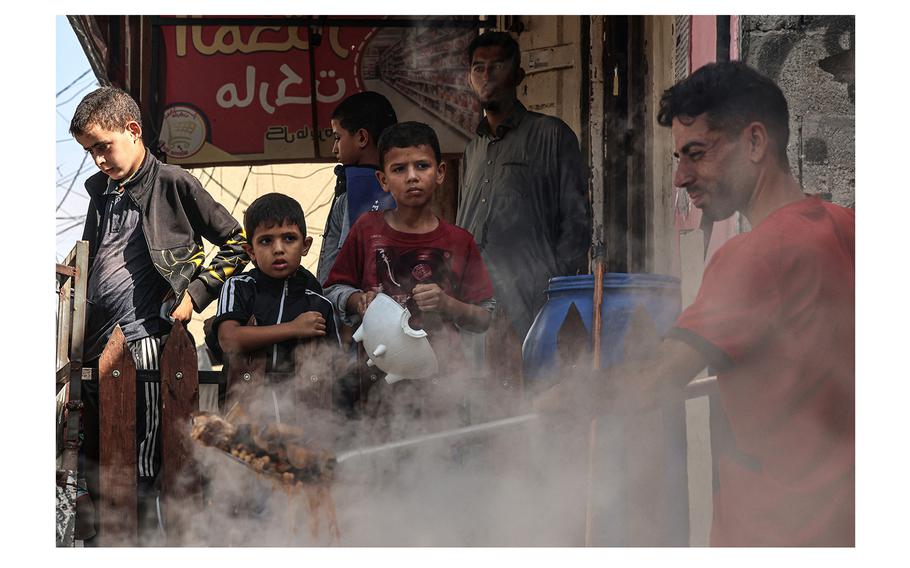
Palestinian children queue to receive a portion of food at a makeshift charity kitchen in Rafah in the southern Gaza Strip on Nov. 8, 2023. (Said Khatib/AFP via Getty Images/TNS)
(Tribune News Service) — Hamas must release more hostages to position itself for a significant increase in aid to Gaza and a pause in fighting, one of the U.S.’s top Middle East envoys said on Saturday.
“The surge in humanitarian relief, the surge in fuel, the pause in fighting will come when hostages are released,” said Brett McGurk, who is President Joe Biden’s Coordinator for the Middle East and North Africa.
McGurk, speaking at the IISS Manama Dialogue, a regional security conference in Bahrain, said the U.S.’s approach has helped hostage negotiations so far.
Hamas, which the U.S. and Europe designate a terrorist organization, swarmed southern Israeli communities on Oct. 7, killing around 1,200 people and taking 240 back to Gaza as hostages. Israel’s responded with massive airstrikes and a ground offensive on the enclave, which the Hamas-run government says have killed more than 12,000 people.
Only four of the hostages have been released, including two American citizens. Israel has freed another, while a few are known to have died, according to Hamas and Israeli officials.
Hamas has lost contact with groups assigned to guard some of the hostages, Abu Obaida, a spokesman for Hamas’ military wing, said Saturday. “The fate of the captives and captors is still unknown,” he said in a statement.
Biden spoke to Qatar’s ruling emir, Sheikh Tamim bin Hamad Al Thani, on Friday about trying to ensure Hamas lets go of more people. Qatar hosts members of Hamas’ political leadership and has been key to the hostages negotiations, acting as a mediator along with other Arab countries such as Egypt.
The hostage talks have been fraught, with Israel and Hamas blaming each other for some of them breaking down.
More aid has gone into Gaza in recent weeks, mostly food and medicine via the Rafah crossing with Egypt. Fuel was sent in on Wednesday for the first time since the conflict erupted. Israel had been reluctant to allow that, saying Hamas would use it for military operations. But it has come under more pressure, including from the U.S., as Gaza’s hospitals and water plants run out of fuel for generators.
The United Nations said the amount of food and fuel going into Gaza is still nowhere near enough to ease what it and Palestinian officials say is a humanitarian disaster.
“The track we have pursued led to the release of two Americans, a mother and a daughter, which was a pilot for what we hope will be a much larger release,” McGurk said. “Such a release of a large number of hostages would result in a significant pause in fighting, a significant pause in fighting and a massive surge of humanitarian relief.”
Jordan’s foreign minister criticized the attempt to link hostage releases to the humanitarian situation in Gaza.
“I just don’t find it acceptable that Israel links humanitarian aid to the release of hostages,” Ayman Safadi, who’s also Jordan’s deputy prime minister, said at the same event in Bahrain. “Israel is taking 2.3 million Palestinians hostage,” he said, referring to Gaza’s population.
©2023 Bloomberg L.P.
Visit bloomberg.com
Distributed by Tribune Content Agency, LLC.